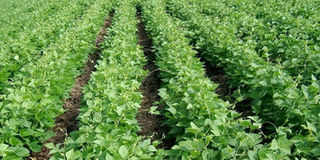Bean farmers narrate successes attained via radio

Arusha. If you go to Kapori, Kileo and Kivulini valleys in Mwanga, Kilimanjaro Region, now you will get the impression that it is that time of the year when farmers in the area are planting beans.
Far from the truth, the beans sprouting there are only an indication of the magnitude of post-harvest losses that affect farmers who have not had a chance to listen to experts’ advice on how to grow the crop. However, Mr Bakari Mmbaga of Kileo Village in Mwanga and his colleagues regard themselves as lucky ones.
Having received expert guidance through a radio programme that is run under a special initiative by the Arusha-based Farm Radio International (FRI), Mr Mmbaga and his colleagues are now aware of what it takes to grow beans correctly to yield maximum returns.
“Since we started taking the radio programmes seriously, our harvests have more than doubled,” says Mr Mmbaga who is in the company of his fellow farmers: Waziri Hassan, Ridhiwani Ismail, Juma Athman Mmbaga, Azizi Nyasi and Jovini Shirima. The farmers say previously they could harvest between two and three bags per acre but currently they are doing seven to eight bags per acre.
Ms Elishililia Mollel who heads the Lilangwera Group from Nasholi Village in Arusha shared similar sentiments.
“Through the radio, we interact with experts from Selian Agricultural Research Institute directly….Through the radio, we now know when to prepare the land; when to plant; which types of seeds to plant when and how to do the weeding; when to harvest and how to minimize post-harvest losses,” she said.
Bean farmers in Kilimanjaro and Arusha are benefitting from the “UPTAKE” project run by FRI, which gets financial support from the International Fund for Agricultural Development (IFAD) under the New Alliance ICT Extension Fund Activity.
Through the project, FRI works with eight radio stations across various regions in the country as it endeavours to bring economic prosperity and food security to small-scale farmers.
“Through the project, we empower broadcasters so they can provide radio services that share knowledge and augment the voices of small-scale farmers, their families and their communities,” said the FRI regional programme manager for East and Southern Africa, Mr Rex Chapota. That way, he said, the programme is deliberately designed to bolster small-scale farmers’ economic positions.
“Our goal is to ensure that every small-scale farmer has access to a radio programme that helps them to succeed,” he said. At the core of the programmes is a state-of-the-art Radio and ICT Innovation Hub that is located at FRI’s offices in Arusha.
According FRI Digital Innovation officer Caroline Kimaro, the hub facilitates the delivery of the right information to farmers in a cost-effective manner with the radio as an intermediary.
“At first, we had what is known as Telerivet through which farmers would send short messages but at a cost. We then improved it further to what we call ‘Uliza (Ask) service which allows them (farmers) to beep via their mobile phones and wait for a call from an expert via the radio,” she said.
Through the system, FRI has been able to reach over 100,000 farmers across the country. According to Kassim Sheghembe, an ICT consultant at FRI, the system issues multiple choice and open-ended questions to farmers. The questions are being carefully screened before an expert in beans farming at Selian responds to them. It also offers an sms alert service, which warns farmers of impending crop diseases, pests and weather challenges to be aware of. The system is being further improved so as to ensure that all the questions from farmers are responded to




